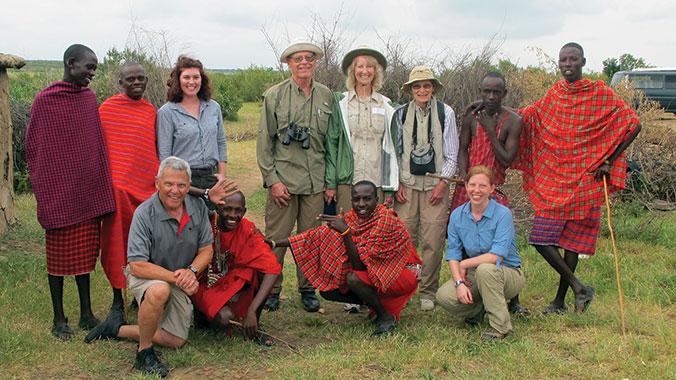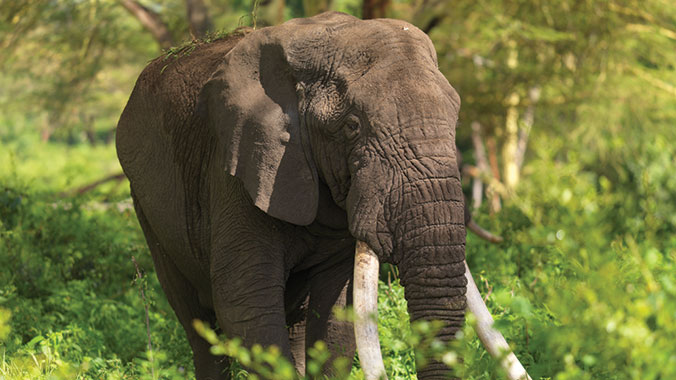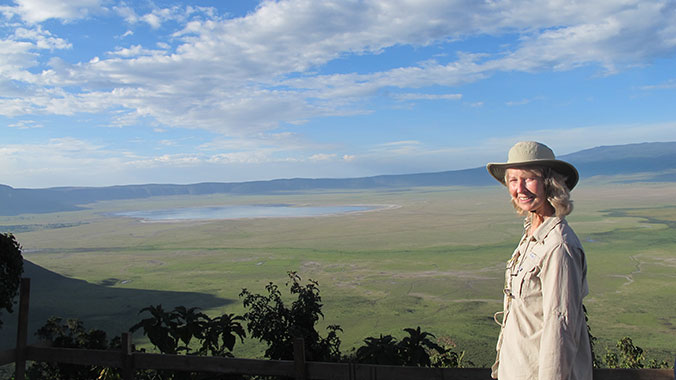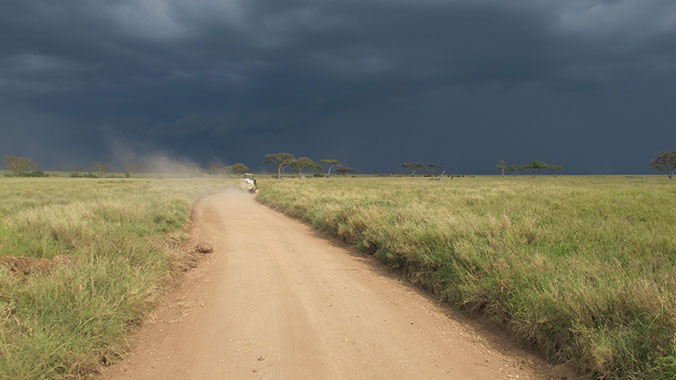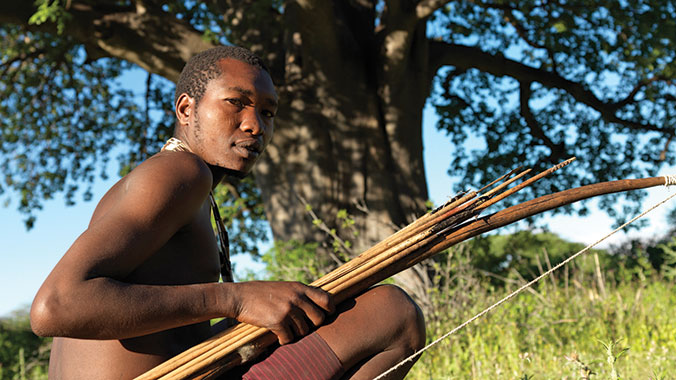Tanzania
Tanzania and the Great East African Migration
Program No. 3716RJ
Witness one of the world’s most awe-inspiring events as you follow the hoofprints of zebra, wildebeest and other ungulates on their migration from the Serengeti to Maasai Mara Reserve.
Itinerary
While we make every effort to ensure the accuracy of our published materials, programs are typically advertised more than a year prior to their start date.
Read More.
While we make every effort to ensure the accuracy of our published materials, programs are typically advertised more than a year prior to their start date. As a result, some program activities, schedules, accommodations, personnel, and other logistics occasionally change due to local conditions or circumstances. Should a major change occur, we will make every effort to alert you. For less significant changes, we will update you during orientation. Thank you for your understanding.
Duration
13 days
12 nights
What's Included
30 meals (
10B, 10L, 10D
)
8 expert-led lectures
17 expert-led field trips
An experienced Group Leader
11 nights of accommodations
Taxes and customary gratuity
Road Scholar Assurance Plan
Day
1
In Transit to Program
Location:
In Flight
Day
2
Arrive Kilimanjaro,Transfer to Arusha, Check-in
Location:
Kilimanjaro/Arusha
Stay:
Arusha Serena Hotel
Activity Note
From the international airport to the hotel is about 30 miles; approximately 1-1.5 hours riding time. Hotel check-in from 3:00 p.m. This is an international travel day; no meals or program activities are scheduled on this day. See your program’s "Getting There" section regarding transfers. Remember to bring your nametag (sent previously).
Evening:
At leisure to relax and get a good night’s rest for the day ahead. Prepare luggage for check out tomorrow.
Day
3
Orientation, Shanga Beads, Tarangire National Park
Location:
Tarangire National Park
Meals:
B,L,D
Stay:
Tarangire Osupuko Lodge
Activity Note
From Arusha to Tarangire National Park is about 100 miles, approximately 3.5 hours riding time.
Breakfast:
At the hotel.
Morning:
Orientation: 8:30 a.m. at hotel. The Group Leader will greet everyone and lead introductions. We will review the up-to-date program schedule, discuss roles and responsibilities, logistics, safety guidelines, emergency procedures, and answer questions. We will learn from the Group Leader as well as local experts who will give lectures and lead field trips. Unless otherwise specified, all transportation during this program will be provided by 4x4 safari vehicles with pop tops. Each vehicle can accommodate 6-7 passengers (plus the driver/guide) in window seats. Meals on our program feature local cuisine. Periods in the schedule designated as “Free time” and “At leisure” offer opportunities to do what you like and make your experience even more meaningful and memorable according to your personal preferences. The Group Leader will be happy to offer suggestions. Program activities, schedules, personnel, and indicated distances or times may change due to local circumstances/current conditions. In the event of changes, we will alert you as quickly as possible. Thank you for your understanding. Before departing the hotel on our first field trip, we'll enjoy an expert presentation on Tanzania's history and current events, plus the country's unique role in East Africa. After checking out of the hotel, we'll drive to Shanga Beads—an inspirational artisan group based in Arusha—for a presentation led by members of the project. Shanga Beads produces beautiful and unique jewelry out of recycled materials. The talented artisans who create the one-of-a-kind handcrafted pieces are physically handicapped and would generally be unable to find work in Tanzania. Proceeds from the business go toward teaching and employing more physically challenged artisans.
Lunch:
At Cultural Heritage House.
Afternoon:
Departing Arusha, we’ll journey southwest to Tarangire National Park and check in at our lodge upon arrival. After some time to freshen up and relax, we’ll have an orientation to the lodge, then assemble for a presentation by our Group Leader on the elephants of Tarangire National Park and an introduction to local conservation efforts.
Dinner:
At the lodge.
Evening:
At leisure.
Day
4
Tarangire National Park - Target Species Game Drive
Location:
Tarangire National Park
Meals:
B,L,D
Stay:
Tarangire Osupuko Lodge
Activity Note
Early morning (pre-breakfast) game drive in the national park, focus on elephants of Tarangire and baobab trees.
Breakfast:
Late breakfast at the lodge.
Morning:
Before breakfast, we'll embark on a game drive in the national park. Our focus today will be on the elephants of Tarangire and the seemingly inverted baobab trees that dot the landscape. Tarangire has one of the highest elephant population densities in Tanzania, making this a prime location for observing these social pachyderms. Upon returning to the lodge, we'll have a late breakfast followed by free time. Take this opportunity to recharge your batteries after today's early start, enjoy the lodge amenities, and ready yourself for our afternoon activities.
Lunch:
At the lodge.
Afternoon:
We’ll head out for another game drive in Tarangire National Park. The Tarangire River snakes through the national park that bears its name. Wildlife travel long distances; drawn to the area's only permanent river. The 1,096 square miles of protected lands are home to a large variety of game such as: wildebeests, elephants, zebras, gazelles, elands, gerenuks, lions and leopards. Extensive grasslands, dusted with the occasional acacia or baobab tree, provide the optimum conditions for viewing wild animals. Bird lovers will not be disappointed-- there are more than 500 avian species found at this park including: Yellow-collared Lovebirds, Rufous-tailed Weavers, Ashy Starlings, Stocking-thighed Ostriches, and Kori Bustards. We’ll return to the lodge with time to freshen up and relax before dinner.
Dinner:
At the lodge.
Evening:
At leisure. Prepare for check out and transfer in the morning.
Day
5
Lake Manyara, Village Visit, Cultural Interaction
Location:
Lake Manyara
Meals:
B,L,D
Stay:
Manyara Lakeview (formerly Manyara Wildlife Safari Camp)
Activity Note
From Tarangire to Mto Wa Mbu is about 66 miles, approximately 2 hours riding time. From Mto Wa Mbu to Lake Manyara is about 5.5 miles. Although not required, previous participants have enjoyed taking coloring pencils/pens and other basic supplies to donate to the local school. Slow paced walking on flat, unpaved village paths.
Breakfast:
At the lodge.
Morning:
After checking out of our rooms and packing the safari vehicles, we'll take our seats and begin the transfer to Lake Manyara. We'll break up our journey with an en route stop at an open-air market. During our visit we will sample some local culture and learn about the various products on display during an exploratory walk led by our Group Leader. Then we will return to our vehicles and ride to a Maasai village to learn about their pastoralist lifestyle through interactions with members of the community. From the village we will drive to a nearby school to gain some insight into the country's educational system. We will have the opportunity to talk and interact with students during an enriching classroom visit.Then we will say our goodbyes to the school and continue our ride to Mto Wa Mbu Village.
Lunch:
At Mto Wa Mbu Village with a local family.
Afternoon:
We'll join our Group Leader on a walk through the community to meet and observe villagers as they go about their daily tasks. Next, we'll reboard the vehicles and complete the final leg of our transfer to Lake Manyara. Arriving at the camp, we’ll check in with some time to freshen up and relax before dinner.
Dinner:
At the camp.
Evening:
At leisure. Prepare for check out and transfer in the morning.
Day
6
Central Serengeti, Maasai Village Visit, Game Drive
Location:
Central Serengeti
Meals:
B,L,D
Stay:
Semipermanent Tented Camp - Central Serengeti
Activity Note
From Lake Manyara to C. Serengeti Camp is about 124 miles, usually just over 4 hours riding time.
Breakfast:
Early, at the camp.
Morning:
Check out and load vehicles. Early morning, we’ll visit a Maasai village to experience the simple and uncluttered lifestyle of the Maasai. From there, we’ll travel to the Central Serengeti region.
Lunch:
Boxed lunch en route.
Afternoon:
We’ll continue our transfer to Serengeti National Park. After going through the gates, we’ll have our first game drive in Central Serengeti. Here, the open grasslands are interspersed with small rocky outcrops, home to small mammals and reptiles that are not touched by the migration. This is also hyena country, which brings into focus the role of scavengers as “waste management” specialists of the migration. We’ll then proceed to the camp, check in, and have a site orientation.
Dinner:
At the camp.
Evening:
At leisure.
Day
7
Central Serengeti Game Drives, Searching for Big Cats
Location:
Central Serengeti
Meals:
B,L,D
Stay:
Semipermanent Tented Camp - Central Serengeti
Breakfast:
Early morning at the camp.
Morning:
On our game drive this morning, we’ll search for big cats — lion and cheetah — and learn whether lions follow the migration. After what we hope will be an exciting morning, we’ll return to camp.
Lunch:
At the camp.
Afternoon:
On this afternoon’s game drive, we’ll search for the unsung little creatures of the Serengeti — such as the dung beetle — and the vital role they play the overall ecology of the migration. We’ll return to camp with time to freshen up and relax before dinner.
Dinner:
At the camp.
Evening:
We'll gather for a Group Leader presentation on the "Great Migration" and ponder the question of whether the future of the migration is in jeopardy.
Day
8
Game Drives, Monitoring & Protecting Wildlife
Location:
Central Serengeti
Meals:
B,L,D
Stay:
Semipermanent Tented Camp - Central Serengeti
Breakfast:
Early, at the camp.
Morning:
We'll enjoy a game drive en route to the Serengeti Park Headquarters. A presentation by a park representative will address the role of ranges and staff of Serengeti National Park in monitoring and protecting wildlife of the park.
Lunch:
At the camp.
Afternoon:
During our next game viewing field trip we will ride in search of the Serengeti's resident elephant herds and baboon troops. We'll return to the camp in the late afternoon. Before dinner, our Group Leader will lead a presentation and discussion about wildebeests and their adaptation mechanisms.
Dinner:
At the camp.
Evening:
At leisure.
Day
9
Game Drives, Grumeti River, Hippos and Crocodiles
Location:
Central Serengeti
Meals:
B,L,D
Stay:
Semipermanent Tented Camp - Central Serengeti
Breakfast:
Early at the camp.
Morning:
Game drive in the park focusing on areas near the Grumeti River. The Grumeti River cuts across the northern boundary of the Western Serengeti and is the first major obstacle facing the animals as they make their way to the promised land of the Masai Mara. With good rains, crossing of the Grumeti River becomes a risky business with large Nile crocodiles submerged in the murky waters. To experience the frenzy of a crossing is one of nature’s rare events and should be celebrated if you are fortunate enough to be at the right place, at the right time to witness this spectacle. We'll return to the camp in time for lunch.
Lunch:
At the camp.
Afternoon:
At the camp, we'll enjoy some "down time" for an opportunity to recharge our batteries. Wildlife is usually not as active during the hottest part of the day. In the latter part of the afternoon, we'll go on a game drive focusing on the resident hippos and crocodiles that frequent the two rivers and the pools in this region. Birds are attracted to the riverine areas and offer a welcome respite from the concentration of large animals of the migration. We'll return to the camp in the late afternoon. Before dinner, as the day comes to a close, we'll join our Group Leader for a sundowner discussion on the significance of the migration on the two million people that live on the periphery of the Serengeti.
Dinner:
At the camp.
Evening:
At leisure. Enjoy our last evening together in the Serengeti, then prepare for check out and transfer in the morning.
Day
10
Olduvai Gorge Archaeological Site, Ngorongoro Crater
Location:
Ngorongoro
Meals:
B,L,D
Stay:
Ngorongoro Serena Safari Lodge
Activity Note
From Central Serengeti to Olduvai Gorge is about 112 miles, approximately 3.5 hours riding time. From Olduvai Gorge to Ngorongoro is about 33 miles, approximately 1.5 hours.
Breakfast:
At the camp.
Morning:
We’ll transfer to the Ngorongoro Crater via Olduvai Gorge, the renowned “Cradle of Mankind” archaeological site where Louis and Mary Leakey made their discovery of Homo Habilis. A local expert will accompany us on a walk through the archaeological site while detailing the lifework of Louis and Mary Leakey and the early human artifacts found at Olduvai.
Lunch:
At Olduvai Gorge, we’ll have boxed lunches.
Afternoon:
We'll continue our transfer to Ngorongoro. When we reach the rim, we’ll pause to take in the first breathtaking view of the Ngorongoro Crater. This is truly one of nature's great spectacles with thousands of animals constantly on the move around the crater floor that is 12 miles in diameter. We’ll move on and check in, freshen up, and regroup for a Group Leader presentation on formation of the crater and the Ngorongoro Conservation Area, a UNESCO World Heritage Site. From the UNESCO “Outstanding Universal Value” inscription: The Ngorongoro Conservation Area (more than 2 million acres, 809,440 hectares) spans vast expanses of highland plains, savanna, savanna woodlands and forests, from the plains of the Serengeti National Park in the north-west, to the eastern arm of the Great Rift Valley. The area was established in 1959 as a multiple land use area, with wildlife coexisting with semi-nomadic Maasai pastoralists practicing traditional livestock grazing. It includes the spectacular Ngorongoro Crater, the world’s largest caldera, and Olduvai Gorge, a 14 km long deep ravine. It has global importance for biodiversity conservation in view of the presence of globally threatened species such as the black Rhino, the density of wildlife inhabiting the Ngorongoro Crater and surrounding areas throughout the year, and the annual migration of wildebeest, zebra, Thompson’s and Grant’s gazelles, and other ungulates into the northern plains.
Dinner:
At the lodge.
Evening:
At leisure.
Day
11
Game Drives in the Ngorongoro Crater, Coffee Farm
Location:
Karatu
Meals:
B,L,D
Stay:
Acacia Farm Lodge
Activity Note
From Ngorongoro to Karatu is about 23 miles, approximately 1 hour riding time. Leisurely paced walk on paved and unpaved paths.
Breakfast:
Early at the lodge.
Morning:
After check out, we’ll climb into 4x4 vehicles for our descent into the crater and a full morning game drive amid one of the most extraordinary concentrations of wildlife on earth. Viewing animals from such relatively close range, with the wall of the crater as backdrop, provides opportunities for incredible photos. Next, we'll transfer to Karatu, arriving for check in at the lodge in time for lunch.
Lunch:
At the lodge.
Afternoon:
Later in the day, we will join our Group Leader in an exploratory walk around the lodge's farm and coffee plantation for a look at the way of life and agricultural practices of a small local farm.
Dinner:
At the lodge. Enjoy your last night in Tanzania among newfound Road Scholar friends.
Evening:
At leisure. Prepare for check out and transfer in the morning.
Day
12
Transfer to Arusha, Day Room in Arusha, Program Concludes
Location:
Kilimanjaro/Arusha
Meals:
B,L,D
Stay:
Mount Meru Hotel
Activity Note
From Karatu to Arusha is about 90 miles, approximately 2.5 hours riding time. Hotel day rooms in Arusha have a 6:00 p.m. check out. Please note that your program does not include overnight hotel reservations for this evening. See your program’s "Getting There" details regarding transfers.
Breakfast:
At the lodge.
Morning:
After check out, we will begin our transfer to Arusha. Before arriving at our hotel, we will pay a visit to a local home to enjoy a family-hosted meal.
Lunch:
At a local home.
Afternoon:
We will arrive at the hotel where we have reserved day room accommodations. This provides an opportunity to relax, finish packing, and freshen-up before transferring to the airport for a night flight to North America.
Dinner:
At the hotel, we will enjoy a light snack before check out. This concludes the program. If you are returning home, safe travels. If you are staying on independently, have a wonderful time. If you are transferring to another Road Scholar program, detailed instructions are included in your Information Packet for that program. We hope you enjoy Road Scholar learning adventures and look forward to having you on another rewarding program in the future. Don’t forget to like our Facebook page and follow us on Instagram. Best wishes for all your journeys!
Day
13
Return Flight to North America
Location:
In Flight
Please select a day to update the map
Map details are not available for this location.

